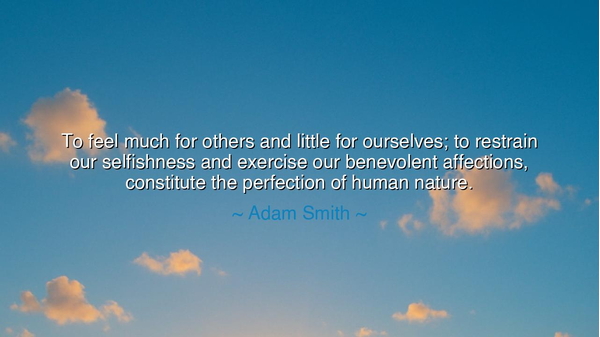
To feel much for others and little for ourselves; to restrain
To feel much for others and little for ourselves; to restrain our selfishness and exercise our benevolent affections, constitute the perfection of human nature.






The words of Adam Smith resound across the centuries like a voice carried upon the wind of wisdom: “To feel much for others and little for ourselves; to restrain our selfishness and exercise our benevolent affections, constitute the perfection of human nature.” In this utterance, he unveils the hidden law of the soul, the sacred measure by which mortals are weighed. For selfishness binds man in chains of narrow desire, but benevolence sets him free, lifting him to the noble height where humanity shines brightest. It is not in the grasping of riches nor in the pursuit of fleeting glory that man is perfected, but in the tender act of caring for others, in the discipline of the heart that denies itself for the sake of another’s good.
This teaching springs from Smith’s great work, The Theory of Moral Sentiments, wherein he, the father of economics, reminded the world that wealth alone cannot form the true foundation of human greatness. He saw that man is not merely a creature of trade and profit, but of sympathy, compassion, and moral striving. He discerned that to feel for others is no weakness but the very essence of strength. By learning to curb the wild horse of selfish impulse, man finds a higher order, a harmony of affections, and a vision of life that transcends his own narrow span.
Consider the story of Marcus Aurelius, emperor of Rome, who ruled not as a tyrant, but as a servant of his people. Though he bore the burden of empire, he wrote in his Meditations that the good of others must always be placed above the cravings of the self. In the cold camps of war, he endured hunger and hardship, but his concern was not his own comfort — it was the welfare of the soldiers, the safety of his subjects, the endurance of justice. Here we see the living example of Smith’s creed: a man who felt much for others, restrained his selfishness, and embodied benevolent affections. His greatness was not in his throne, but in his heart.
Such virtue does not belong to kings alone. Recall Florence Nightingale, the Lady with the Lamp, who walked through dark wards filled with the groans of the wounded. She abandoned the luxuries of her station, embraced the filth of war hospitals, and spent her strength to ease the suffering of forgotten men. She exemplified the truth that to feel for others more than for oneself is the summit of human beauty. Her life was a beacon of selfless service, and by it she illumined the path that others might follow.
The lesson is plain: to live for self alone is to live in shadow, but to live for others is to dwell in light. The soul that clings to selfish desire grows withered and small, but the soul that gives itself in love expands beyond measure. The perfection of human nature is not found in the accumulation of treasure, but in the discipline of compassion, in the daily choice to place the welfare of another above the hunger of the self.
And how shall we practice this? Begin with small acts. Listen when another speaks, even when your own tongue burns to reply. Offer help, not when it is convenient, but when it is needed. Give alms not from abundance alone, but even from your want. Learn the art of silence when anger tempts you, and the art of forgiveness when injury stings you. In these daily disciplines, the heart is trained, the selfish impulse curbed, and the soul rises toward the perfection that Smith spoke of.
Let the young remember this: greatness is not a crown, nor wealth, nor conquest. It is the quiet power to feel another’s sorrow and make it less, to rejoice in another’s joy and make it greater. The legacy of a man is not what he gathers to himself, but what he gives away. Like a river, he is remembered not for the waters he hoards, but for the lands he nourishes.
Therefore, let us strive each day to restrain our selfishness and to exercise benevolence, for this is the law written upon the heart, the song sung by the sages, the hope of every generation. He who feels deeply for others, who conquers his own desires, becomes not merely a man, but a living testament of what mankind was meant to be — radiant, compassionate, and whole.






AAdministratorAdministrator
Welcome, honored guests. Please leave a comment, we will respond soon